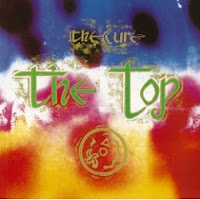In response to last week's re-posting of our
Catcher in the Rye
song list, a number of readers weighed in with additional musical references to author J.D. Salinger, who died on January 27th. Most of them bend our
Ground Rules, but they're fun anyway.
JustinBoston reminded us that The Cure's 1984 album
The Top
features a song called
Bananafishbones
. Robert Smith, the band's primary songwriter, confirmed the song's connection to Salinger's story "A Perfect Day for Bananafish," from his collection
Nine Stories
, in an issue of the fanzine
Cure News: "the title, for some no-reason, from 'a perfect day for bananafish' - a short story by j d salinger .. again me hating myself..." [Capitalization and punctuation courtesy of Mr. Smith and
Cure News].
Vanessa Wieland wrote to say "Pre-My Chemical Romance, the rhythm guitarist was in a band called Pencey Prep. They had a song called
The Secret Goldfish
." The guitarist in question is Frank Iero. The name of the band and the name of the song both derive from
The Catcher in the Rye. Pencey Prep is the fictional school from which Holden Caulfield is expelled; and "The Secret Goldfish" is the title of a short story referred to in the novel, written by Holden's brother D.B. The song appears on the band's 2001 album
Heartbreak in Stereo
.
Anonymous pointed out that the 2005 debut album from We Are Scientists is called
With Love and Squalor
--a reference to Salinger's story "For Esmé with Love and Squalor," available in the
Nine Stories collection.
thevoiceofenergy points out that a song called
Polar Bear
, from Ride's 1990 album
Nowhere
, mentions Salinger's
Raise High the Roof Beam, Carpenters
. The same story lent its name to "
a delightful Chicago-based band," according to
Adam.
Michial recalled a song by the Old 97's called
Rollerskate Skinny
, from the 2001 album
Satellite Rides
. The song's title comes from Holden Caulfield's description of his sister, Phoebe, in
The Catcher in the Rye: "She's quite skinny, like me, but nice skinny. Roller-skate skinny. I watched her once from the window when she was crossing over Fifth Avenue to go to the park, and that's what she is, roller-skate skinny."
Chris Kubica called attention to the name of Lisa Loeb's band--Nine Stories--and to an album by the Winona Ryders called
J.D. Salinger
.
Finally, Paul Wilner suggested a song called "My Foolish Heart," from the 1949 film of the same name--the only film to date to be based on Salinger's writing (it was adapted from his story "Uncle Wiggly in Connecticut," another selection from
Nine Stories). The song was nominated for an Academy Award and has been recorded by many artists; Paul favors
Bill Evans' version
.









